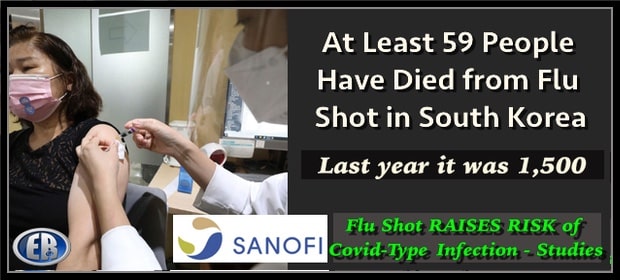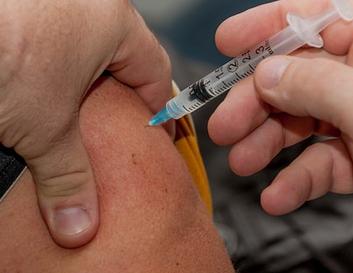
As of Monday, at least 59 people, mostly in their 70s and 80s, have died in South Korea following flu vaccination, up from 46 Saturday. That’s among more than 14.7 million people who have been inoculated this season.
Last year, more than 1,500 elderly people died within seven days of taking flu vaccines—deaths that were not linked to immunization, the government said, according to Reuters. Old people and young children in South Korea are eligible for free inoculations under a national scheme.
Last year, more than 1,500 elderly people died within seven days of receiving flu vaccines, but those deaths were not linked to the vaccinations, the government said.
South Korea ordered 20 per cent more flu vaccines this year to ward off the prospect of what it calls a “twindemic” of concurrent major flu and coronavirus outbreaks in winter.
At least 1,154 instances of adverse reactions have been reported from among more than 9.4 million people inoculated since the effort began in September.
It’s curious that the Korean health authorities aren’t familiar with a 2020 Pentagon study, showing that the flu vaccine renders recipients up to 36% more susceptible to non-flu viral respiratory infections such as ‘covid’. See here and here for that study. We remind readers of a report we published a little while ago by French paediatric oncologist Dr. Nicole Delepine, detailing how a group of Belgian healthcare professionals were rushing to court to get stopped a government plan to vaccinate up to 3 million people, including healthcare workers, with the flu shot. (See Avoid the Flu Vaccine: Belgian Health Professionals Rush to Court Against Govt Policy) The Pentagon study formed the basis of the Belgian court claim.
We also remind readers of the similar stupidity of the UK government on behalf of Big Pharma. See UK announces ‘most comprehensive flu program in history,’ aims to vaccinate 30mn.
In addition to the 2020 Pentagon study, here are other studies demonstrating the same susceptibility to NON-FLU viral respiratory infections from the flu shot, research and links courtesy of Children’s Health Defense:
- 2018 CDC Study: Flu shots increase risk of non-flu acute respiratory illnesses (ARI) in children.
- 2011 Australian Study: Flu shot doubled risk of non-influenza viral infections and increased flu risk by 73%.
- 2012 Hong Kong Study: Flu shots increased the risk of non-flu respiratory infections 4.4 times and tripled flu infections.
- 2017 Study: Vaccinated children are 5.9 more likely to suffer pneumonia and 30.1 times more likely to have been diagnosed with Allergic Rhinitis than unvaccinated children.
- 2014 Study: Influenza-vaccinated children were 1.6 times more likely than unvaccinated children to have a non-influenza “Influenza-like-illness” (ILI).
48 People Dead After Taking Flu Vaccine in South Korea
NEED TO KNOW NEWS
South Korea reports that 48 people recently have died after getting flu shots, but said it would carry on with the state-run vaccination program anyway because it found no direct link between the deaths and the shots. South Korea ordered a fifth more flu vaccines this year to ward off what it calls a “twindemic”, or the prospect that people with flu develop coronavirus complications and overburden hospitals in winter. The Korean Medical Association, an influential group of doctors, urged the government to halt all inoculation programs for now, to ensure the vaccines were safe, but the government has refused. Singapore is the first country to temporarily halt the use of the two influenza vaccines as a precaution while their health agency is investigating. -GEG

Singapore has temporarily halted the use of two influenza vaccines as a precaution after some people who received them in South Korea died, becoming among the first countries to publicly announce a halt of the vaccines’ usage.
South Korea reported that, as of Saturday, 48 people had died after getting flu shots, but said it would carry on with the state-run vaccination programme because it found no direct link between the deaths and the shots.
No deaths associated with influenza vaccination have been reported in Singapore to date, but the decision to halt the use of SKYCellflu Quadrivalent and VaxigripTetra was precautionary, the health ministry and the Health Sciences Authority (HAS) said in a statement on Sunday.
The HSA is in touch with the South Korean authorities for further information as it investigates to determine whether the deaths are related to flu vaccinations.
SKYCellflu Quadrivalent is manufactured by South Korea’s SK Bioscience and locally distributed by AJ Biologics, while VaxigripTetra is manufactured by Sanofi and locally distributed by Sanofi Aventis.
Additional source:
************

••••
The Liberty Beacon Project is now expanding at a near exponential rate, and for this we are grateful and excited! But we must also be practical. For 7 years we have not asked for any donations, and have built this project with our own funds as we grew. We are now experiencing ever increasing growing pains due to the large number of websites and projects we represent. So we have just installed donation buttons on our websites and ask that you consider this when you visit them. Nothing is too small. We thank you for all your support and your considerations … (TLB)
••••
Comment Policy: As a privately owned web site, we reserve the right to remove comments that contain spam, advertising, vulgarity, threats of violence, racism, or personal/abusive attacks on other users. This also applies to trolling, the use of more than one alias, or just intentional mischief. Enforcement of this policy is at the discretion of this websites administrators. Repeat offenders may be blocked or permanently banned without prior warning.
••••
Disclaimer: TLB websites contain copyrighted material the use of which has not always been specifically authorized by the copyright owner. We are making such material available to our readers under the provisions of “fair use” in an effort to advance a better understanding of political, health, economic and social issues. The material on this site is distributed without profit to those who have expressed a prior interest in receiving it for research and educational purposes. If you wish to use copyrighted material for purposes other than “fair use” you must request permission from the copyright owner.
••••
Disclaimer: The information and opinions shared are for informational purposes only including, but not limited to, text, graphics, images and other material are not intended as medical advice or instruction. Nothing mentioned is intended to be a substitute for professional medical advice, diagnosis or treatment.




